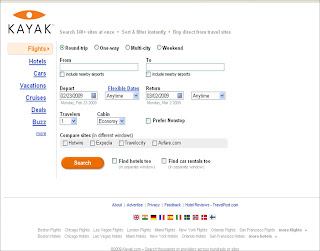
Expedia's
TripAdvisor is claiming more than 20 million reviews on their site. In addition they have been on a steady and apparently unstoppable campaign to buy niche review sites in areas such as Cruise, holidays, airline seats and vacation rental.
You'll find the latest list of everything they have bought here. As a result (
and as predicted here) they have morphed from a destination site to an online advertising network and meta-search company called (unsurprisingly) the
TripAdvisor Media Network.
While that has been going on in the background,
the front end of TripAdvisor looks like an Onlnie Travel Agency site with tabbed header, a search widget middle left, deals and promos in the the C column and content and search help below the fold. Clearly a move to compete directly with the OTAs in drawing in consumer loyalty and repeat business.
Despite all the changes, the heart of TripAdvisor is the reviews. The dedication of the user base to write detailed, descriptive, useful and Google friendly content to attract lookers and bookers. This all ties to the baseline of the TripAdvisor band and their tag line -
"get advice from real travellers". Unfortunately stories are coming out about possible flaws in TripAdvisor's mechanism for ensuring that reviews are only written by "real travellers".
Just recently the Times in the UK ran a piece called "
Who's really writing the reviews on TripAdvisor". The story quoted one hotelier as saying
"the system is laughably easy to manipulate....I was even approached by PR first offering to write my reviews for me." Newsweek also covered the story in their article "
TripAdvsor tries to respond to fake hotel reviews". In that story journalist Sean O'Neil noted that he did not understand why
"TripAdvsor didn't duplicate Amazons "Real Name" feature, which offers third-party verification that a reviewer is the person he or she claims to be".The question is not whether or not their are fake reviews on TripAdvisor - clearly there are. The question is how many are there and what influence do they have in hotel rankings, especially in smaller destinations. Consumer Travel uber Blogger Chris Elliott put the question best in his story "
Does TripAdvisor hotel manipulation scandal render the site completely useless".
The official word from TripAdvisor (
care of Elliott's post) is that they have a zero tolerance for fake reviews (they call it fraud) and a three methods for policing this policy. Quote -
"1. Every review is screened prior to posting and a team of quality assurance specialists investigate suspicious reviews
2. Proprietary automated tools help identify attempts to subvert the system
3. Our large and passionate community of more than 25 million monthly visitors help screen our content and report suspicious activity"
An example of this approach can be seen on the entertaining TripAdvisor We're Not Making This Up Blog (in the post called "
Exactly") where an irate hotel DOS is complaining that all of the reviews he is writing for his own hotel are being pulled down.
What is missing is independent confirmation that the customer actually stayed in the hotel. My view is that these three steps are not enough. Technology and human review will simply not be enough to screen out the "gamers". The only way to be truly clear of fraud is for TripAdvisor to move to a "no stay, no say" rule. A means of verifying that the person writing the review has stayed at the hotel. This could be achieved though a combination of approaches such as a feature like the Amazon Real Name service, using the enormous amounts of transaction and searching data that the Expedia Inc empire collects, drawing on information from advertising partners and other verification mechanisms.
The counter view is that this would be too hard for TripAdvisor as they do not do any of the bookings, that is left to the advertiser. While there is some truth to that argument, between the data collected by TripAdvisor on click behaviour, information provided by advertisers and information from what must be a massive
Expedia Inc privacy killing data warehouse, there is (I am sure) more than enough data available to TripAdvisor to verify. I would not be cheap or easy to do, but in my opinion necessary
What do you think - should TripAdvisor move to a "no stay, no say" rule or is the fraud so small that it doesn't need to?If you are looking for more commentary on this story also check out
As always I close with confirmation that
Expedia owns TripAdvisor. Other than searches for my name, Google searches for "
who owns TripAdvisor" is my number one source of search traffic.


















